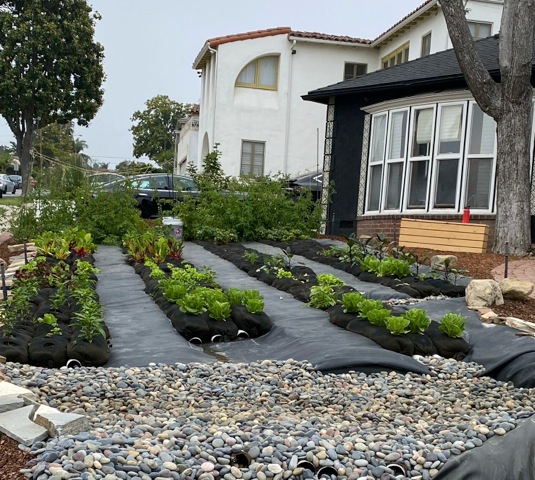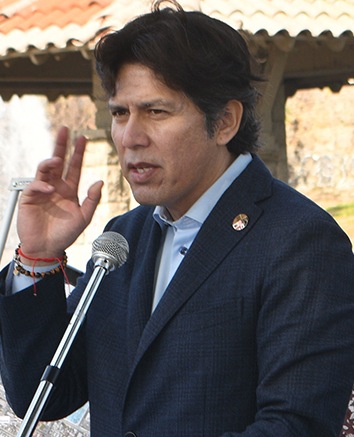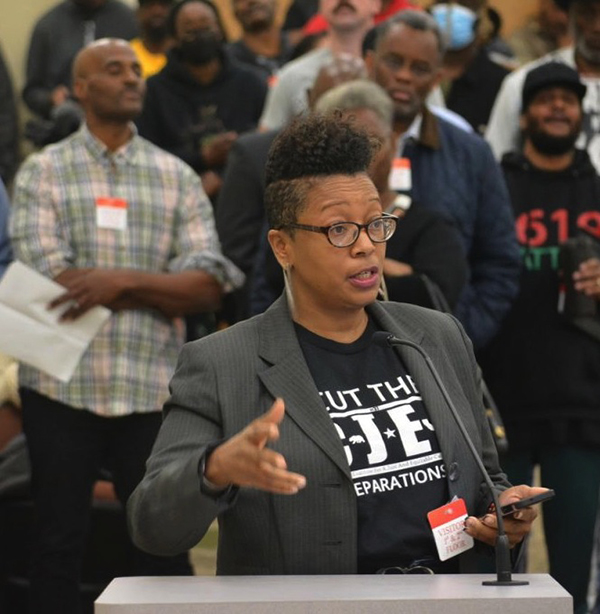By Darlene Donloe
Contributing Writer
VIEW PARK — It’s early Wednesday morning and there’s a cool crispness in the air as a group of gardeners busy themselves planting and harvesting a variety of herbs, fruits and vegetables in the front yard of a home located on the corner of Angeles Vista Boulevard and Olympiad Drive.
Prominently displayed on a popular thoroughfare, the colorful garden is filled with brilliant red cherry tomatoes and rows of rainbow chard, lettuce, bok choy, Tuscan kale, basil and chives all peeking out from a filter sock as if to introduce themselves to the bright morning sun. The microfarm, which produces enough food to feed 50 families, will be filled regularly with five or six rotating items that could also include oregano, thyme, peppers, radicchio, green onions and eggplant.
The cornucopia of produce is part of Crop Swap LA, a social enterprise seeking to grow food in unused spaces, creating sustainable green jobs and hyper-local, nutrient-rich food.
About 10% of what they grow is donated to the community fridge in Leimert Park next to Hot and Cool Café.
Crop Swap LA, a startup that installs and manages microfarms, is the brainchild of Jamiah Hargins, 37, who founded the organization in 2018. His goal was and continues to be to close the nutritional gap in South Los Angeles by creating an infrastructure for all communities to have access to nutrient-rich food and the knowledge to grow it.
Crop Swap LA was able to install the first micro-farm through a grant from LA2050, a Goldhirsh Foundation program.
“People have the right to have local food,” said Hargins, a married father of one. “Something like this allows people a choice. This is about food freedom.”
Hargins chose those particular vegetables and fruits because he wanted items that “were normal to people.”
“I wanted a variety,” he said. “We considered doing just one crop, but until we have more microfarms that can balance the volume, we decided to start out with a variety.
“This being the first one, we want to see what works well. It’s a bit experimental with what we’ve chosen. It also depends on what our seedling providers have. Seasonal choices of course. We’re not trying to trick nature.”
Gabriel Stout met Hargins at the West Adams Farmers Market. He heard about what Hargins was doing and reached out about volunteering.
“I came here early one morning and started digging irrigation systems and then I just came back,” said Stout, who started volunteering last February. “I’ve always loved plants. I’ve learned so much in the last couple of months.
“The inspiration is seeing what this can do and how many people this can feed. When we started, 10 people signed up. Now we have signed up 50. Once a week they come. Our harvest days are Wednesdays and Sundays when people come to pick up their food.”
Because Hargins wants it to be hyper-local, residents who are interested in a produce subscription program with Crop Swap LA must live within two miles of the microfarm. He plans to narrow the proximity for the next one.
“The price is super reasonable,” said Hargins, referring to the cost of participation. “It should be $70 a month for what we’re giving them because they can come four times a month and get a bag. Instead, we’re charging $36 a month, $43 for delivery. Eventually, we’re going to go to $50 for this microfarm. This is an important mission. The public needs it.”
Angie Terrell is one of those View Park residents, who lives less than two miles from the Asante Microfarm and takes advantage of the fresh, organic produce. She comes by once a week to pick up a bag of produce.
“I think this is a great idea,” she said. “That’s why I participate.”
Michael Creer, a teacher, and his mother, Donna Jones, a school nurse, have owned the View Park home for more than 20 years. Creer said he was open to his front yard being transformed into a microfarm for selfish reasons.
“One of the main reasons I said yes had to do with water consumption,” said Creer, a math teacher at Stella Middle Charter Academy. “This used to be a nice, luscious grass area. Over time I and my mom watched the water bill constantly go up and down just from watering the grass. We weren’t taking that many showers, doing that many dishes, or doing that much laundry.”
Creer, who works with Hargins’ wife, Ginnia, said he and his mother needed to do something different with their lawn.
“This is amazing,” said Creer, who has a land-use agreement with Hargins’ organization. “It’s over what I expected. I expected something minimal. The main thing was water.
“I wanted to use my water for more than just watering the grass. I needed to use it more than once. To me, it’s not a status symbol to have a nice lawn.”
Hargins chose Creer’s house for his first location because it was a Black-owned house in a Black neighborhood.
“When I was considering the first location, I knew I wanted it in a Black neighborhood,” said Hargins. “I saw his place. I said we have to do this. It’s about my people. Black people first.
“Everybody should take care of their own people first. If you don’t you could be all alone. My next plan is to put one in a Hispanic neighborhood.”
Hargins, who partnered with Enviroscape LA for the microfarm installation, said the Asante Microfarm’s water recycling garden automatically reuses the water.
When putting the irrigation system together, they dug seven-foot-deep pits filled with water. The system is hooked up to the city water.
“We have it on a separate meter, so it’s separate from the family’s operation,” Hargins said. “We’re only using 8% of the water that was previously used to grow grass there. Now, it’s growing food. There are about 660 gallons of water reserved on site. It also captures rainwater. It’s the first garden in the world that does this.”
There is a lot of demand to participate in the Crop Swap. There are currently 50 members and a waiting list of 50. There is even a waiting list of 40 for whenever Hargins opens the next front lawn sustainable microfarm.
It all started when Hargins, a self-proclaimed Army brat who claims New Mexico as his home base, although he has lived in Brazil, Chicago, North Dakota, New York and England, began a garden in his backyard as a means of feeding his daughter nutritious food. Due to the repeated excess, he hatched a plan to swap his surplus food with his neighbors.
The idea blossomed, expanding dramatically, and led to Hargins founding the West Adams Farmer’s Market/Crop Swap, located on Western Avenue and Adams Boulevard.
Determined, committed and incredibly enthusiastic about the possibilities, Hargins, who plans to open 40 more microfarms in Los Angeles over the next 15 years, wasn’t finished. He wanted more, so he launched Asante MicroFarm, which he calls a “Black American resistance to food apartheid.”
Asante is “thank you” in Swahili.
“Opening up more of these will help the infrastructure and the city will understand that there is no going back to food slavery,” said Hargins, who ditched being a trader of stocks, bonds, options and futures because he “hated the culture”.
Gardening has done a lot more than provide sustenance for Hargins.
“Gardening has improved my life,” he said. “It can improve everyone’s life. We have a sustainable food source. This is a learning environment for everyone.”
Darlene Donloe is a freelance reporter for Wave Newspapers who covers South Los Angeles. She can be reached at ddonloe@gmail.com.













